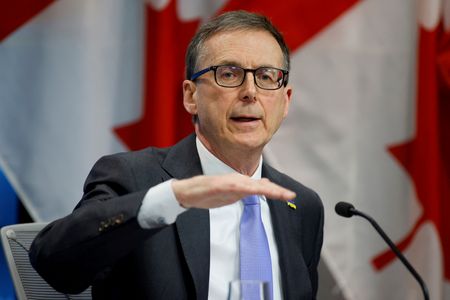By Indradip Ghosh
(Reuters) – The Bank of Canada will raise its overnight rate by 50 basis points on Oct. 26, a smaller amount than at previous meetings, but will get rates to an even higher peak than expected last month, according to economists polled by Reuters.
The expected move at the BoC’s next meeting would be the second consecutive reduction in the size of rate rises after a 100 basis point move in July and 75 basis points last month.
In the meantime, the risk of an economic slump is rising. The survey showed around a 50% probability of a recession over the coming 12 and 24 months, a significant upgrade from 35% and 40% predicted just three months ago.
But with inflation still running three times above the BoC’s target of 2%, Governor Tiff Macklem recently said a persistently strong U.S. dollar means the BoC will have “more work to do”.
Given more U.S. Federal Reserve rate rises are due in coming months, the BoC is likely to get the overnight rate, currently at 3.25%, even further above its 2-3% estimate of neutral, where the economy is neither stimulated nor restricted.
A strong majority of 90% of economists, 27 of 30, expected a half-point rise next week to 3.75%, according to an Oct. 12-18 Reuters poll, in line with rate futures. The remaining three expected another 75 basis point hike.
So far the BoC has matched the 300 basis points of Fed rate rises since March. The U.S. central bank has hiked by 75 basis points at three consecutive meetings and is likely to do so again at its next one.
“We continue to assume the BoC will dial back the pace of rate hikes with a 50 basis point increase later this month,” said Josh Nye, senior economist at RBC.
“But the Fed’s hawkishness and the currency’s weakness keep a 75 basis point increase on the table, and any upside surprise in key inflation and inflation expectations data between now and October 26 could tip the scales in favor of a larger move.”
Most economists forecast another slowdown in the size of rate rises to 25 basis points in December and January, taking the overnight rate to a peak of 4.25%. That is still three-quarters of a point higher than predicted in the previous poll.
Nearly all respondents to an additional question, 19 of 20, said risks were skewed towards a higher rate peak.
Inflation, currently at 7%, was predicted to slow, but remain above the BoC’s target of 2% at least until Q3 2024. All but two of 17 who replied to an additional question said the cost of living crisis would worsen over the coming six months.
House prices, which soared during the pandemic, are now falling and the job market is slowing. Canada’s economy was forecast to expand only 0.8% next year, one-quarter of this year’s predicted growth rate of 3.2%.
Nearly one-third of economists in the latest poll had an official forecast that expects a recession to start at some point over the coming year. That is in line with a recent BoC survey which showed most firms now think a recession is likely.
But many economists, 13 of 19, said any recession would be short and shallow. Four said it would be long and shallow, two said there would not be one.
(For other stories from the Reuters global economic poll)
(Reporting by Indradip Ghosh; Polling by Vijayalakshmi Srinivasan, Mumal Rathore and Dhruvi Shah; Editing by Ross Finley and Raissa Kasolowsky)

